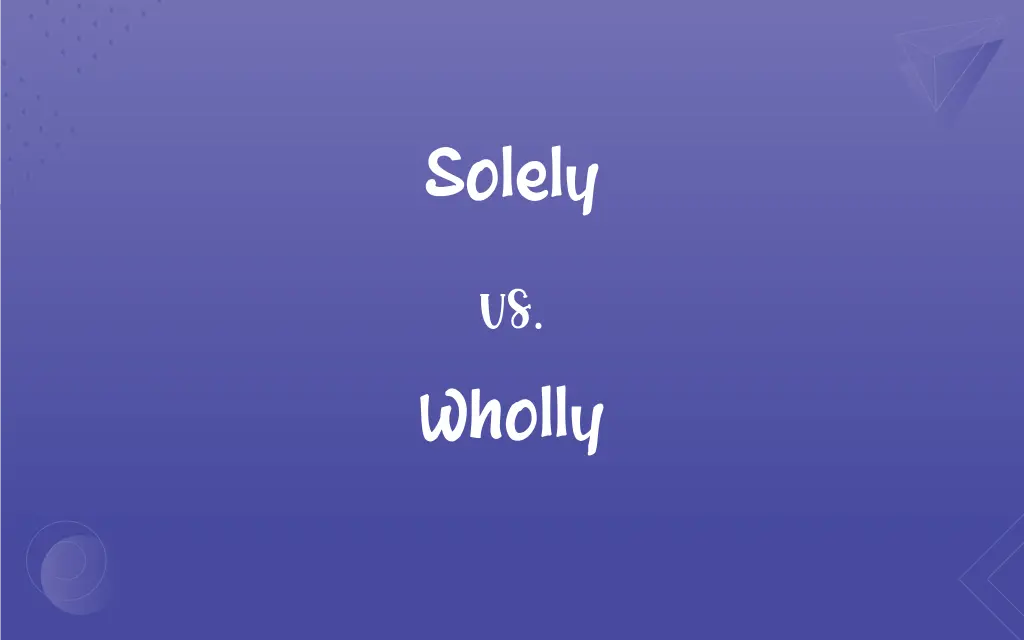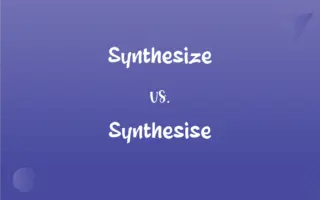Solely vs. Wholly: What's the Difference?
By Harlon Moss & Janet White || Updated on May 24, 2024
"Solely" means exclusively or only one thing, while "wholly" means completely or entirely without exception.

Key Differences
"Solely" refers to something done exclusively or uniquely by one entity or for one purpose. For example, one might say, "She is solely responsible for the project," indicating that only she has this responsibility. "Wholly," on the other hand, indicates something done entirely or fully. For instance, "He was wholly satisfied with the results" means he was completely satisfied without any reservations.
"Solely" is often used in contexts where exclusivity is highlighted. For example, "The decision was made solely by the manager," emphasizes that no one else was involved in the decision-making process. "Wholly" emphasizes the totality of a situation or condition. For instance, "The team was wholly committed to the goal" indicates complete dedication from all members.
In legal or formal contexts, "solely" might be used to indicate exclusive rights or responsibilities. For example, "She has the sole right to use this trademark," suggests no one else can use it. "Wholly" is more likely used in contexts discussing comprehensive conditions or states, like "The property is wholly owned by the company," meaning the company has complete ownership.
"Solely" often precedes a verb or noun to specify the exclusive nature of an action or responsibility, like in "He is solely in charge." "Wholly" can modify adjectives and participles to stress the entirety of a state or action, such as "wholly unacceptable" or "wholly devoted."
"Solely" can also imply a sense of limitation, as it restricts the action or attribute to one specific entity or aspect. For example, "She relies solely on public transport" means she uses no other means of transportation. "Wholly" removes limitations by emphasizing completeness, as in "They were wholly unprepared," meaning their lack of preparation was complete and without exception.
ADVERTISEMENT
Comparison Chart
Definition
Exclusively; only one thing
Completely; entirely without exception
Usage
Highlights exclusivity
Emphasizes totality
Common Context
Legal/formal settings
Comprehensive states/conditions
Grammar
Often precedes a verb or noun
Can modify adjectives and participles
Implication
Implies limitation to one entity/aspect
Implies completeness without limits
ADVERTISEMENT
Solely and Wholly Definitions
Solely
For one specific reason.
He came solely to see you.
Wholly
Entirely; without exception.
The project was wholly successful.
Solely
Without any others involved.
The decision was made solely by the manager.
Wholly
In every respect.
She is wholly committed to her work.
Solely
Limited to a single source.
The success was solely due to her efforts.
Wholly
Completely; in full extent.
He was wholly satisfied with the results.
Solely
Exclusively or only one thing.
She is solely responsible for the project.
Wholly
Fully; to the fullest extent.
They were wholly unprepared.
Solely
Not involving anyone else.
He handled the matter solely.
Wholly
Completely and absolutely.
The plan is wholly unacceptable.
Solely
Alone; singly
Solely responsible.
Wholly
Completely; entirely
"The old American purposes are still wholly relevant" (John F. Kennedy).
Solely
Entirely; exclusively
Did it solely for love.
Wholly
Exclusively; solely.
Solely
Alone; exclusively.
The new chef was solely responsible for attending the grill.
Wholly
Completely and entirely; to the fullest extent.
Solely
Singly; alone; only; without another; as, to rest a cause solely one argument; to rely solelyn one's own strength.
Wholly
Exclusively and solely.
A creature wholly given to brawls and wine.
Solely
Without any others being included or involved;
Was entirely to blame
A school devoted entirely to the needs of problem children
He works for Mr. Smith exclusively
Did it solely for money
The burden of proof rests on the prosecution alone
A privilege granted only to him
Wholly
In a whole or complete manner; entirely; completely; perfectly.
Nor wholly overcome, nor wholly yield.
Wholly
To the exclusion of other things; totally; fully.
They employed themselves wholly in domestic life.
Wholly
To a complete degree or to the full or entire extent (`whole' is often used informally for `wholly');
He was wholly convinced
Entirely satisfied with the meal
It was completely different from what we expected
Was completely at fault
A totally new situation
The directions were all wrong
It was not altogether her fault
An altogether new approach
A whole new idea
FAQs
What does "solely" mean?
"Solely" means exclusively or only one thing.
What does "wholly" mean?
"Wholly" means completely or entirely without exception.
Can "solely" be used to indicate responsibility?
Yes, e.g., "She is solely responsible for the project."
Is "wholly" used to emphasize totality?
Yes, e.g., "He was wholly satisfied with the results."
How does "solely" differ from "only"?
Both imply exclusivity, but "solely" often emphasizes the singularity more strongly.
Is "wholly" always positive?
Not necessarily, it depends on the context, e.g., "wholly unprepared."
Can "solely" precede a noun?
Yes, e.g., "He is solely in charge."
Does "wholly" imply completeness without limits?
Yes, it emphasizes full extent.
Does "solely" imply limitation?
Yes, it implies restriction to one entity or aspect.
Is "wholly" synonymous with "completely"?
Yes, they can often be used interchangeably.
Can "solely" be used in legal contexts?
Yes, e.g., "She has the sole right to use this trademark."
Does "solely" mean no one else is involved?
Yes, it means without any others involved.
Can "wholly" describe someone's commitment?
Yes, e.g., "She is wholly committed to her work."
Is "solely" synonymous with "exclusively"?
Yes, they are often used interchangeably.
Can "wholly" indicate a complete lack?
Yes, e.g., "They were wholly unprepared."
Can "wholly" describe a state or condition?
Yes, e.g., "The property is wholly owned by the company."
Can "solely" indicate a single purpose?
Yes, e.g., "He came solely to see you."
Is "wholly" used in everyday language?
Yes, though often in more formal or emphatic contexts.
Does "wholly" modify adjectives and participles?
Yes, e.g., "wholly unacceptable."
Can "solely" be used in positive contexts?
Yes, e.g., "He is solely dedicated to his work."
About Author
Written by
Harlon MossHarlon is a seasoned quality moderator and accomplished content writer for Difference Wiki. An alumnus of the prestigious University of California, he earned his degree in Computer Science. Leveraging his academic background, Harlon brings a meticulous and informed perspective to his work, ensuring content accuracy and excellence.
Co-written by
Janet WhiteJanet White has been an esteemed writer and blogger for Difference Wiki. Holding a Master's degree in Science and Medical Journalism from the prestigious Boston University, she has consistently demonstrated her expertise and passion for her field. When she's not immersed in her work, Janet relishes her time exercising, delving into a good book, and cherishing moments with friends and family.































































